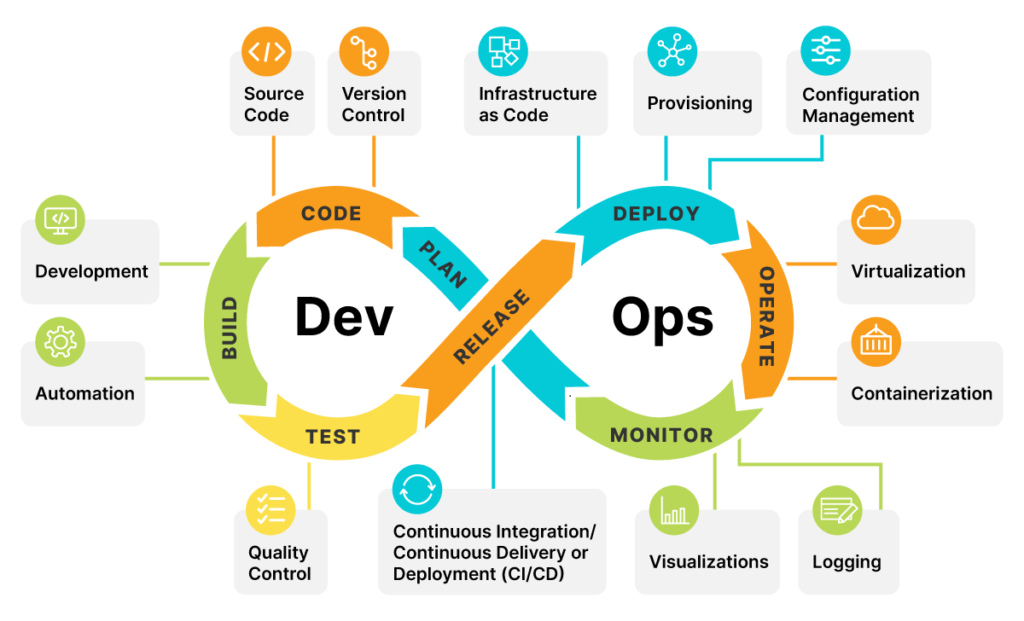 DevOps Course:
DevOps Course:
Master the principles and practices of DevOps and accelerate your software delivery pipeline with our comprehensive DevOps course. Designed for IT professionals, developers, and operations teams, this program will equip you with the skills and knowledge needed to streamline development, deployment, and operations processes for faster, more reliable software delivery.
Course Overview:
Our DevOps course is designed to help you understand and implement the collaborative culture, automation, and efficient practices that form the foundation of DevOps. Whether you are an aspiring DevOps engineer, a software developer, or an IT professional, this course will empower you to drive organizational transformation and deliver value to your customers through continuous integration, continuous delivery, and improved collaboration.
Key Learning Objectives:
1. Introduction to DevOps:
– Understand the core principles, values, and benefits of the DevOps approach.
– Learn about the cultural and organizational aspects of DevOps.
– Explore the DevOps lifecycle and its key stages.
2. Continuous Integration and Continuous Delivery (CI/CD):
– Implement automation practices for building, testing, and deploying software.
– Configure and manage CI/CD pipelines using popular tools such as Jenkins, GitLab CI/CD, or AWS CodePipeline.
– Understand best practices for version control, code reviews, and automated testing.
3. Infrastructure as Code (IaC):
– Learn how to provision and manage infrastructure using code.
– Explore infrastructure provisioning tools such as AWS CloudFormation, Terraform, or Ansible.
– Implement version control and automated testing for infrastructure code.
4. Configuration Management and Orchestration:
– Manage and maintain consistent configurations across environments using tools like Chef, Puppet, or Ansible.
– Automate application deployment and configuration updates.
– Implement infrastructure orchestration and management using tools like Kubernetes or AWS Elastic Beanstalk.
5. Monitoring and Logging:
– Implement effective monitoring and alerting strategies.
– Utilize logging and log analysis tools to troubleshoot issues and improve system performance.
– Implement centralized logging and monitoring solutions such as ELK stack, Prometheus, or AWS CloudWatch.
6. Collaboration and Communication:
– Foster effective collaboration and communication between development and operations teams.
– Implement agile practices and encourage cross-functional teams.
– Utilize collaboration tools like Slack, Jira, or Microsoft Teams to facilitate communication and teamwork.
Why Choose Our DevOps Course?
– Experienced Instructors: Learn from experienced DevOps practitioners who bring real-world expertise and best practices to the classroom.
– Hands-on Labs: Gain practical experience through hands-on exercises, projects, and simulations in a realistic DevOps environment.
– Industry-Relevant Skills: Acquire the skills and knowledge needed to excel in DevOps roles and drive organizational transformation.
– Exam Readiness: Prepare for industry-recognized DevOps certifications such as AWS Certified DevOps Engineer or Docker Certified Associate.
– Career Advancement: Boost your professional credentials and open doors to exciting career opportunities in DevOps and cloud engineering.
Our DevOps course will empower you to build a collaborative, automated, and efficient software delivery pipeline, enabling faster and more reliable releases. Join us today and take the next step in your DevOps journey!
